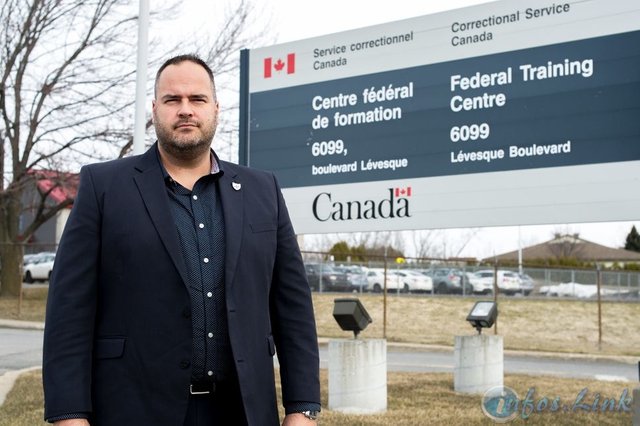Corrections officers worried

The president of the Quebec correctional officers' union, Frédérick Lebeau, fears an "escalation of incidents of violence" if stays in isolation become regulated, as the new law proposes.
They fear "losing control" if legislation that limits administrative segregation is passed by Ottawa
Correctional officers fear the passage of an administrative segregation supervision act, saying it could undermine the order of prison walls, and possibly push detainees to attack. them.
Tabled in the House of Commons over the last few months, Bill C-56 would impose a maximum annual number of 21 days in remand, commonly known as the "hole" in jargon. That number would then increase to 15, one and a half years after the act came into force.
Correctional officers deplore the fact that they will be deprived of a "necessary work tool". They also fear that their safety will be compromised if the bill passes, noting that the average number of days spent in administrative segregation in Canadian penitentiaries is currently 24.5. According to data obtained by Le Journal under the Access to Information Act, some federal prisons still have higher averages.
Fears
"Sometimes, if, for example, they are threatened by another inmate, they manage to go to the hole by doing disguised mischief. Once they reach their maximum, they will still get out of the row, but what will they do? Get in on ourselves physically? "Fears a correctional officer interviewed by Le Journal , who wishes to remain anonymous.
The president of the union of correctional officers of Quebec, Frédérick Lebeau, shares this apprehension. "It's as if in society we had a police, but we did not put people in jail after a twenty-first offense," he illustrates.
"The hole is not a dungeon"
To explain its overhaul of the correctional system, the Department of Public Safety says it must "correct the false perspectives and directions of the Harper era. [...] Our goal is to have high-level correctional practices that comply with the Canadian Charter of Rights and Freedoms. "
An affirmation that makes the Conservative senator Pierre-Hugues Boisvenu react. "People often tend to believe that administrative segregation is a dungeon, but that is not the case. Criminals have a TV in their cell, plugged in with the cable. When I saw people going into isolation, they took off the television, put it under their arms and went there, "he says.
In the event that an inmate is kept in solitary confinement beyond the twenty-first day, the bill also provides for the appointment by the Minister of Public Security of an "independent external examiner" who will evaluate the file. Currently, it is the penitentiary administration that can determine whether the extension of administrative segregation is maintained or not.
Occupancy rate plummeting in federal prisons
The occupancy rate in federal prisons has plummeted in Quebec and Ontario since Justin Trudeau's Liberals came to power.
This is revealed by data obtained by Le Journal under the Access to Information Act. In Quebec, the average occupancy rate of federal detention centers increased from 101% during the Stephen Harper era to 82% last year.
In Ontario, the average rate went from 95% in 2014 to 87% last year.
Far from being surprised by these statistics, Conservative Senator Pierre-Hugues Boisvenu deplores the fact that parole is now "facilitated" by the Trudeau government, which, in his view, undermines the very principle of pardon. "Closing the world for three months, six months, and there is no measure or [no] program undertaken, it is useless," said Mr. Boisvenu.
"If, for example, an individual is sentenced to three years in prison and released to the third, the year he has been imprisoned will have been useless, since that is the time it takes to know in which center you will be incarcerated and enrolled in a rehabilitation program, "he explains.
Management "too flexible"
The president of the correctional officers' union believes that the management of penitentiaries has become "too flexible" with the Trudeau government coming to power.
"This is the trend [the decline in the occupancy rate in prisons]. The Conservatives were really tough on crime in their management of crime, "says Frédérick Lebeau.
PREVENTIVE ISOLATION IN FEDERAL PRISONS
- Inmate is in cell 22 hours a day
- He is entitled to one shower per day
- After 24 hours, he can recover his belongings
- He has a toilet and a bed
- He is entitled to visits
- Stays are usually between one and seven days
- The detainee is entitled to a Bible
FEDERAL PRISONS IN QUÉBEC WHERE THE AVERAGES OF INSOLIDATED DAYS ARE HIGHEST:
1. Special Detention Unit (Sainte-Anne-des-Plaines)
- 2014-2015: 104
- 2015-2016: 25
- 2016-2017: 45
- 2014-2015: 43
- 2015-2016: 27
- 2016-2017: 38
- 2014-2015: 42
- 2015-2016: 39
- 2016-2017: 26
- 2014-2015: 31
- 2015-2016: 35
- 2016-2017: 35
- 2014-2015: 34
- 2015-2016: 27
- 2016-2017: 21
nice follow me i will follow you back.
Thanks, if you bring nice content I will find you no worries.
Congratulations @infoslink! You have completed the following achievement on Steemit and have been rewarded with new badge(s) :
Click on the badge to view your Board of Honor.
If you no longer want to receive notifications, reply to this comment with the word
STOPTo support your work, I also upvoted your post!
Do not miss the last post from @steemitboard:
SteemitBoard World Cup Contest - The semi-finals are coming. Be ready!
Participate in the SteemitBoard World Cup Contest!
Collect World Cup badges and win free SBD
Support the Gold Sponsors of the contest: @good-karma and @lukestokes